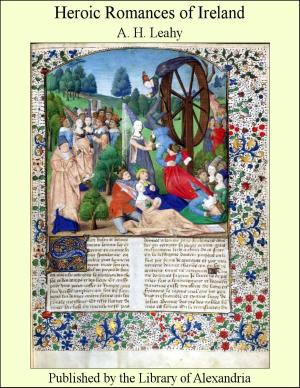Abolition: a Sedition By a Northern Man
Nonfiction, Religion & Spirituality, New Age, History, Fiction & Literature| Author: | Geo. W. Donohue | ISBN: | 9781465556868 |
| Publisher: | Library of Alexandria | Publication: | July 29, 2009 |
| Imprint: | Library of Alexandria | Language: | English |
| Author: | Geo. W. Donohue |
| ISBN: | 9781465556868 |
| Publisher: | Library of Alexandria |
| Publication: | July 29, 2009 |
| Imprint: | Library of Alexandria |
| Language: | English |
We trust it will be obvious to all, that it was impossible to treat Abolitionism according to its merits, or to exhibit its true character, without regarding it as a religious movement. There are two prominent features of the moral and religious history of our country, with which we have been compelled to come in contact. We, therefore, take this opportunity so far to explain, as to bar the accident of being misapprehended. First, then, we have averred the philosophical connexion of antecedent and consequence between Abolitionism and violent reforms. It is proper, therefore, that we should state how much we are willing to be understood as meaning by this couplet of terms, having such a relation to the subject of this work. We say, then, that by violent reforms, we mean those religious and moral agitations of our country, which have proved alike unfriendly to religious and social order, which are generally disapproved by sober Christians, and we believe by the great majority of Christians, of all, or nearly all, denominations. It is possible, that on a single point we have hit hard a cherished opinion of many persons, for whom we have the greatest respect; but as it relates merely to a mode of action, we must claim to be indulged in our own opinion in that matter, as we allow the same privilege to others. In the next place, we have found it necessary, in the exhibit we have made of the political machinery of the Abolition movement, to enquire into its origin; and it will be manifest to all, that it was brought from the religious world. The fact, that the model of the American Anti-slavery Society was borrowed from the Religious and Benevolent Society system, could not implicate those institutions, in the estimation of the public, unless they should see fit to follow the same example, and so far as they might do it, by going over from the religious and moral, into the political sphere; which, we trust, they will be wise enough not to do. It was necessary to describe the machinery of those Societies in order to give the true picture of the one under particular consideration; but we have taken care at the same time to state, that the American Anti-slavery Society has betrayed and violated the principles of the Religious and Benevolent Society system, by first assuming its model, and then passing over into the field of political action. That all these machineries are well adapted to political ends, whenever they may be perverted and applied in that direction, it is unnecessary to say; and the only way to escape the charge, is to avoid the fault. The Abolition Society has gone openly into that field, on which account we have considered it fair and exactly true to represent it as a political organization, and as being necessarily such from the work it has taken in hand. Having, therefore, explained on these two points, we submit the work, without farther comment, to speak for itself. January 1, 1839
We trust it will be obvious to all, that it was impossible to treat Abolitionism according to its merits, or to exhibit its true character, without regarding it as a religious movement. There are two prominent features of the moral and religious history of our country, with which we have been compelled to come in contact. We, therefore, take this opportunity so far to explain, as to bar the accident of being misapprehended. First, then, we have averred the philosophical connexion of antecedent and consequence between Abolitionism and violent reforms. It is proper, therefore, that we should state how much we are willing to be understood as meaning by this couplet of terms, having such a relation to the subject of this work. We say, then, that by violent reforms, we mean those religious and moral agitations of our country, which have proved alike unfriendly to religious and social order, which are generally disapproved by sober Christians, and we believe by the great majority of Christians, of all, or nearly all, denominations. It is possible, that on a single point we have hit hard a cherished opinion of many persons, for whom we have the greatest respect; but as it relates merely to a mode of action, we must claim to be indulged in our own opinion in that matter, as we allow the same privilege to others. In the next place, we have found it necessary, in the exhibit we have made of the political machinery of the Abolition movement, to enquire into its origin; and it will be manifest to all, that it was brought from the religious world. The fact, that the model of the American Anti-slavery Society was borrowed from the Religious and Benevolent Society system, could not implicate those institutions, in the estimation of the public, unless they should see fit to follow the same example, and so far as they might do it, by going over from the religious and moral, into the political sphere; which, we trust, they will be wise enough not to do. It was necessary to describe the machinery of those Societies in order to give the true picture of the one under particular consideration; but we have taken care at the same time to state, that the American Anti-slavery Society has betrayed and violated the principles of the Religious and Benevolent Society system, by first assuming its model, and then passing over into the field of political action. That all these machineries are well adapted to political ends, whenever they may be perverted and applied in that direction, it is unnecessary to say; and the only way to escape the charge, is to avoid the fault. The Abolition Society has gone openly into that field, on which account we have considered it fair and exactly true to represent it as a political organization, and as being necessarily such from the work it has taken in hand. Having, therefore, explained on these two points, we submit the work, without farther comment, to speak for itself. January 1, 1839















